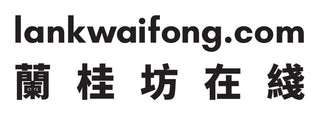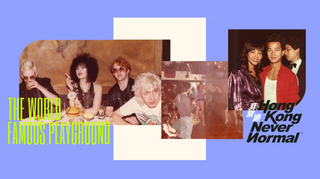We’re sharing this story as part of @hknevernormal, an initiative dedicated to celebrating the extraordinary nature of our city. Check out www.hknevernormal.com for more inspiring stories!
Lan Kwai Fong (LKF) is not just a destination; it is the heartbeat of Hong Kong, recognized globally for its vibrant nightlife and cultural richness. Originally a quiet alley, it transformed into a lively hotspot in the late 1980s, evolving into a dynamic hub that attracts both locals and tourists. With its eclectic mix of bars, restaurants, and cultural events, LKF offers a unique experience that captures the essence of a city that never sleeps.
A Very Humble Beginning

Nestled in Central Hong Kong, Lan Kwai Fong, meaning "Orchid Square," was once a tranquil space dominated by flower stalls and warehouses. Before World War II, it served as a gathering place for mui yun, professional matchmakers. The atmosphere was a far cry from the electrifying nightlife that would later flourish.
The 70s: Disco Disco – The Club That Started It All

The 1970s marked a turning point for Hong Kong's nightlife. While the first discos emerged in Tsim Sha Tsui, it was the opening of Disco Disco (where nightlife institution VOLAR was later located) in 1978 that sparked a revolution in Lan Kwai Fong. Founded by Gordon Huthart, a well-connected socialite, Disco Disco aimed to create a space where everyone—regardless of race, sexual orientation, or social standing—could enjoy themselves. The club quickly became a hotspot for celebrities like Madonna and Rod Stewart, transforming Central into a lively nightlife destination.
Andrew Bull Behind the Decks at Disco Disco, Lan Kwai Fong, Hong Kong, 1981

Huthart's vision was inspired by the unrestrained discos he had experienced in San Francisco. With a packed dancefloor and an atmosphere filled with disco and funk music, Disco Disco set the stage for what modern nightclubs in Hong Kong would become.
The 1980s: From Local to Global Phenomenon

In the 1980s, Allan Zeman recognized the potential of Lan Kwai Fong and transformed it into a world-class nightlife destination. In 1983, he opened California Restaurant and Bar, envisioning a casual social setting free from formal dress codes. This establishment quickly became a cornerstone of LKF's nightlife, evolving into a bustling nightclub after dark.
Zeman expanded his influence by acquiring several properties, including the California Entertainment Building and California Tower, creating one-stop destinations for dining and nightlife that continue to attract a diverse crowd.

Zeman was born in Regensburg, Germany, and was raised in Montreal, Canada. His journey began after the death of his father when he was just seven, leading him to work various jobs from a paperboy at 10 to cleaning tables at 12, earning more than his teachers. By 19, he had launched a fashion business, making his first million by importing ladies’ jumpers from Hong Kong. His frustration with the lack of informal dining options drove him to open California Restaurant, sparking a transformation in the area and earning him the title "Father of Lan Kwai Fong."
Cultural Impact: A Safe Haven for Diversity

Disco Disco played a significant role in shaping the cultural landscape of Hong Kong, particularly for the LGBTQ+ community. Andrew Bull, a DJ at The Scene, reflected on the courage of Huthart during those times: “So, it was very dangerous to be gay in those days, but when I was DJing at The Scene, Gordon would come down and deliberately dance with his boyfriend, knowing security would bundle them off the dancefloor and throw them out. He was like a gay suffragette,” he shared.
He continued, “Gordon was quite well-funded relative to anybody else at that time, and [he was] determined to make a statement. So, when Studio 54 became the talk of New York, he said, ‘Right, we’re going to do Studio 54 for Hong Kong.’” This bold vision not only offered a safe space for self-expression but also laid the groundwork for the inclusive nightlife culture that thrives in LKF today.
The 1990s and 2000s: A Nightlife Renaissance

As the 1990s unfolded, Lan Kwai Fong continued to flourish as a nightlife destination. Iconic venues like KEE Club, Club 1997, and Volar emerged, contributing to its notoriety. By the early 2000s, however, the old clubs were struggling to attract the cool young crowds they once did. In 2002, Gilbert Yeung, son of Emperor Group founder Albert Yeung, opened Dragon-i, a daring new club in an untapped area above the then-quiet Wyndham Street. Dragon-i added much-needed Chinese representation to Central’s clubbing scene.
As nightlife in Hong Kong became more scattered, clusters of bars emerged in areas such as Soho, Wan Chai, Tsim Sha Tsui, and Mong Kok, each offering its unique atmosphere. Despite this dispersion, LKF has maintained its status as a premier nightlife destination.
LKF Today: A Celebration of Hong Kong’s Spirit

The spirit of Disco Disco and Lan Kwai Fong lives on through club nights, alternative music lounges, and underground parties organized by collectives like Yeti Out, Spin Sum, and Magic Room. Today, Lan Kwai Fong is a dynamic nightlife hub, continuously evolving to reflect the culture of Hong Kong.
Beyond its clubs and bars, the area hosts a variety of cultural events, art exhibitions, and celebrations that showcase the city's unique identity. Lan Kwai Fong also serves as a prime location for global sporting events, including the Official Rugby Sevens Afterparty and major music festival after-parties at top clubs like Fayy, Boomerang, Dragon-i, and Cassio.
Events such as Clockenflap, Ultra Music Festival, Creamfields, and the S20 Songkran Music Festival attract attendees from around the world, reinforcing LKF's status as a premier entertainment destination. During special occasions like Halloween and New Year's Eve, the crowds can bring the area to a standstill, highlighting its role as a focal point for celebrations in Hong Kong.
As the heartbeat of the city, Lan Kwai Fong not only reflects the vibrancy and resilience of Hong Kong’s culture but also continues to inspire a sense of community and celebration, making it a timeless landmark where the past and present coalesce in a joyous embrace.



